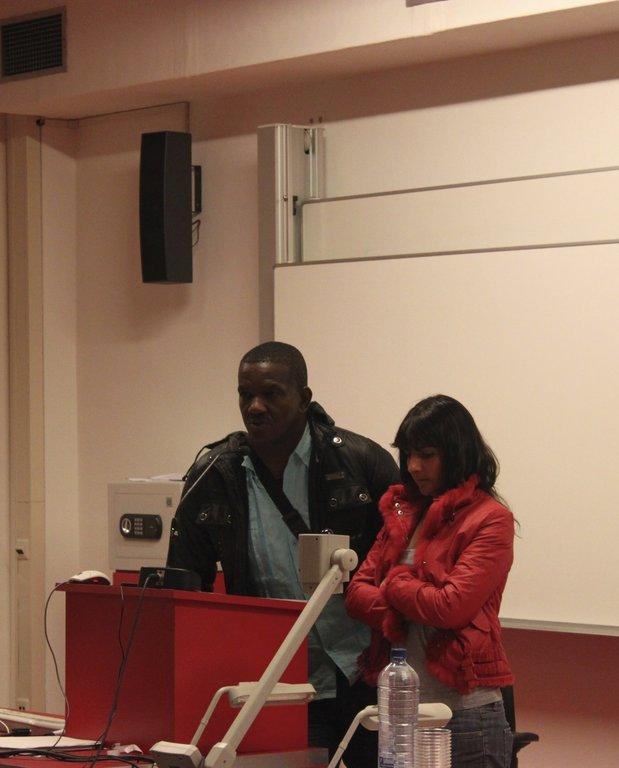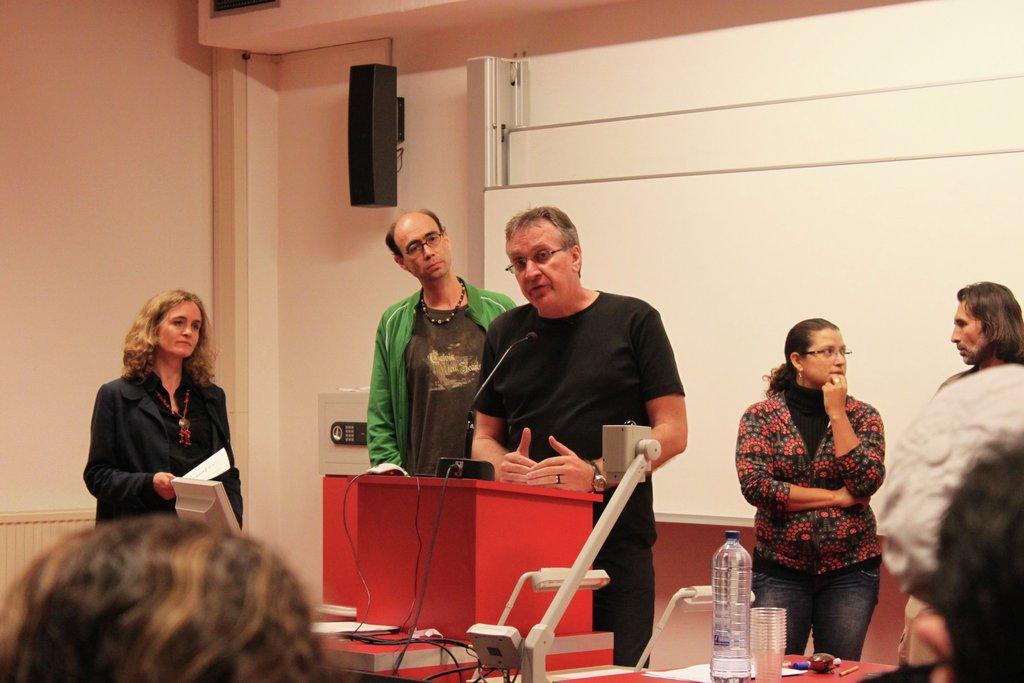

Preceding the international conference ‘Lands and Rights in Troubled Waters’, FIAN Netherlands organized a film screening and debate at Utrecht University. Two documentaries were shown to highlight conflicts related to land grabbing and socio-environmental harm in Colombia and Brazil from a human rights perspective.
The documentary ‘La Toma’ shows the struggle of an Afro-Colombian community to remain on its land in the Cauca Valley in the south of Colombia. The community is living from artisanal gold mining and faces eviction by the military to make place for the multinational corporation AngloGold Ashanti. They managed to suspend the eviction order from the government, but it is not likely that this will be a permanent victory.
After the film, guest speakers from the La Toma community, Friends of the Earth Colombia, the National University of Colombia and FIAN Colombia were present for debate. By responding to questions of the audience, they provided more information on this complex situation.
Lisifrey Ararat, representative of the Community Council of La Toma, is one of the Afro-Colombian leaders of the resistance movement against the interests of multinationals. He first emphasized that he is not necessarily against large-scale mining, but aims to strengthen jurisdictional resistance to defend artisanal mining and guarantee this practice for future generations as well. The government, however, does not care about the small miners and only has an interest in the big multinationals as they are considered to be the only ones that will generate development for the country. Ararat explained the importance of raising awareness on this issue at the international level, as the international community might be able to pressure Colombia to change its regulations and policies. He further explains how alliances with other indigenous and Afro-Colombian communities have been valuable in their resistance movement. A national movement of artisanal miners has been organized and they have protested on the streets. However, Ararat says they are treated as military objectives and the government falsely claims they oppose development. Being seen and heard is crucial, as it is the only way to protect the rights of the community to stay in their territory and realize their economic, social and cultural rights as Afro-Colombians. The downside of the growing visibility of the conflict is that violence and criminalization of local leaders has increased. Juan Carlos Morales, co-founder of FIAN Colombia and local officer for the LAR project, commented on the need for Afro-Colombians to have their territory recognized in order to have the right to collectively own and administrate their territory – as is already the case for the indigenous territories in Colombia. Several international human rights instruments provide a framework for the protection of these
communities, especially the right to territory and to free prior and informed consultation / consent regarding decisions about their territories and resources. With more than five million internally displaced people between 1985 and 2010, Colombia has one of the highest rates of internal displacement in the world.
The second documentary, ‘Killerbean-the story about the crop that is eating up the Amazon’, shows the problems of land grabbing, land conflicts, deforestation and loss of biodiversity resulting from the rapid expansion of soy monocultures in Western Pará, Brazil. It shows the company Cargill that has illegally built a soy harbour in Santarém and is making huge profit from this shipping monopole. In addition, it can be seen how big farmers displace local communities - sometimes with violence - and exploit their workers. Following the screening of the film guest speakers Gilson de Jesus Rego from Comissão Pastoral da Terra Santarém (CPT), Judith Costa Vieira, assistant professor at the law faculty of the Universidade do Oeste do Pará (UFOPA) and Dr. Sérgio Sauer, National Rapporteur for Human Rights in Land, Territory and Food, explained more about the current conflicts around soy expansion in Brazil.
They spoke about the importance of the projects in Santarém to denounce environmental crimes, corporate crimes and human rights violations related to soy cultivation and deforestation. How was it possible for global agribusiness player Cargill to build a soy harbour in Santarém without doing a proper environmental impact study? The speakers stated that the local communities that suffer from injustice are unprotected and need support to be able to claim their rights.
Just like in Colombia, the counterarguments from big investors such as Cargill are that they bring many jobs to the region and therefore generate development. In Brazil, soy is a very important crop for economic growth as the country is the second largest soy producer in the world. However, the soy plantations are very problematic in many respects. These large monocultures are highly mechanized and do hardly provide any jobs, while they lead to further concentration of land and profit in the hands of a few. Mainstream media in Brazil do not report much on these developments, and when they do, it is generally in a positive manner. Unlike the expansion of industrial mining in Colombia, the expansion of soy in the Amazon is a slow process and does not always operate through illegal mechanisms. Big farmers often take control over resources by just buying or leasing land and pushing small farmers out. There is injustice rather than illegality.
Trailer La Toma: http://www.imdb.com/title/tt1706423/
Video about la Toma: El Oro para Suarez: Mineros Afrocolombianos Defendiendo sus Raíces. (Spanish): http://www.youtube.com/watch?v=e6r4zUTyUtQ&feature=share
Video ‘Killerbean’: http://vimeo.com/10538760
Interview with Dr. Sergio Sauer (University of Brasilia): Soy Farming and Land Grab in the
Brazilian Amazon
http://www.thewaterchannel.tv/en/videos/categories/viewvideo/1389/food-…-
and-land-grab-in-the-brazilian-amazon
Interview with Dr. Saturnino (Jun) Borras (Institute for Social Studies, ISS): 5 Ways to Re-Think
Land-Grabs
http://www.thewaterchannel.tv/en/videos/categories/viewvideo/1387/food-…-
re-think-land-grabs
Interview with Gilson Rego: “Não é possível explorar e conserver”
http://www.rnw.nl/portugues/article/%E2%80%9Cn%C3%A3o-%C3%A9-poss%C3%AD…-
e-conservar%E2%80%9D
Lands & Rights Project: www.landsandrights.blog.com
FIAN Netherlands: www.fian-nederland.nl